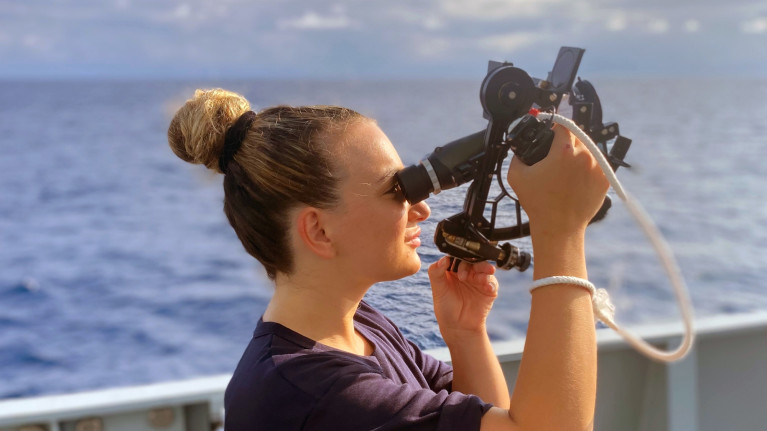Displaying items by tag: Scholarship Scheme
Cadets from Trinity House to Join UK Royal Navy Ships in New Merchant Navy Training Link-Up
Trinity House which is the General Lighthouse Authority responsible for England, Wales and the Channel Islands, is in an exchange scheme between the UK Merchant Navy and the Royal Navy.
The Merchant Navy Cadets sponsored by Trinity House as part of its Merchant Navy Scholarship Scheme will be part of an exchange involving the Merchant Navy and the Royal Navy.
The exchange will place 30 Merchant Navy Cadets (majority of whom are Trinity House-sponsored) on board Royal Navy ships this winter. This arrangement is part of a long-standing agreement which has given trainee Royal Navy officers the opportunity to sail on merchant vessels, giving them extra time at sea, especially on the bridge.
Before the pandemic, nearly 150 Royal Navy officers spent time with the Merchant Navy—including helping to crew cross (English) Channel ferries for an insight into safely guiding a ship through busy waters.
To offer something by way of return, the Royal Navy has now formalised a reciprocal arrangement.
Merchant Navy Cadets will spend three months at a time on patrol and survey ships to help with their training and give them a greater understanding of the Royal Navy’s role.
One such officer is Trinity House Deck Cadet Scarlett Barnett-Smith (pictured above), who is currently on transfer to Royal Navy patrol ship HMS Tamar (see fishery dispute story from earlier this year).
She says the time attached to the patrol ship on a “once-in-a-lifetime passage” has been a hugely rewarding experience; HMS Tamar has just entered the Pacific via the Panama Canal.
“The immensely dedicated crew have been extremely welcoming and helpful, allowing me to grow and understand the responsibilities as a sailor of the Royal Navy,” she said.
“I’m looking forward to one day seeing HMS Tamar from the bridge as an Officer of the Watch in the Merchant Navy, and will think fondly of her throughout my career.”
The first batch of Merchant Navy officers are due to join their ships this month having completed their navigational training.
Administering the scheme in his capacity as the Royal Navy’s Merchant Navy Liaison Officer is Lieutenant Commander David Carter, also a Younger Brother of Trinity House.
“This is something of a novel concept for the Royal Navy but it runs alongside several strands of the Merchant and Royal Navy coming closer together in the maritime sphere for multiple ‘wins’,” he explains.
“All the Merchant Navy cadets who have sailed with the Royal Navy so far have loved it and these cadets will be the next generation of influencers who will have the Royal Navy close to their hearts.”
Naturally, the exchange scheme will continue to send Royal Navy and Royal Marines personnel on board Merchant Navy vessels for voyages that can last from one week to three months on a variety of vessels, including cargo and container ships, fast-craft, passenger ferries, Ro-Ros and tankers. While on board, they participate in their share of duties, including watch keeping, loading and discharging cargo, machinery space routines, domestic activities and—where appropriate—passenger care.
Trinity House’s Director of Maritime Training Captain Nigel Hope remarked of the newly-formalised initiative: “Our Merchant Navy Scholarship Scheme has a great new pull for future candidates with this new learning exchange.
“This development adds significant breadth to an already industry-leading cadetship offering for young people who want to take up one of the best possible careers out there. For anyone looking at a career at sea and its wealth of benefits, both personal and professional, I urge you to take up a Trinity House Cadetship through the MNSS.”
For further information on the scholarship scheme click here.
Welsh Port’s Scholarship Scheme Launched for Pembrokeshire University Students
At the Welsh Port of Milford Haven the annual Scholarship Scheme was launched today offering four Pembrokeshire students the chance to win £1,500, plus work experience at the UK’s largest energy port.
Almost seventy undergraduate students have received support from the Port over the past sixteen years and completed placements across the organisation including the Engineering, PR, Environmental and HR departments.
There are four awards on offer; to be eligible applicants must have attended a Pembrokeshire secondary school and be enrolled on an undergraduate course at a British university.
Stakeholder Engagement and Communications Manager, Anna Malloy, commented “Our Scholarship Scheme is a fantastic opportunity for students to not only secure some much-needed funds while at university, but also complete meaningful placements working on real projects in a busy, professional environment. I’d like to stress that students can be on any type of course, it doesn’t have to be marine related. Over the years we’ve had people enrolled onto all sorts of subjects, from Human Nutrition to Chemistry.”
Interviews will be held in person at the Port of Milford Haven’s headquarters on Wednesday 18th December by a panel consisting of the Port’s Chairman Chris Martin, Maxine Thomas from Pembrokeshire College and Headteacher of Haverfordwest High VC School Jane Harris.
To apply to the Scholarship Scheme please visit this link for an application form.
Applications close on 22nd November.
Deadline Approaches for Welsh Port of Milford Haven's Scholarship Scheme
#Ports&Shipping - Time is running out for Pembrokeshire students in south Wales to apply to the Port of Milford Haven’s annual Scholarship Scheme.
The deadline for applications is at the end of this week, so don’t hesitate - apply now to be in with a chance of securing one of four awards of £1,500 as well a sought-after work placement next year. To be eligible, students must be attending a British university following an undergraduate course and have spent the majority of their secondary education in Pembrokeshire.
Since the scheme was launched in 2003, over sixty people from a wide range of backgrounds have benefitted from the scholarships. There are no restrictions on the subjects that students are enrolled onto as the projects offered during the placements can be tailored to suit their specialist subject area or interests. Over the past few years the Port has welcomed students following courses such as Environmental Science, Geography, Mechanical Engineering and Music and were subsequently placed within the engineering, environmental and marketing departments.
The judging panel this year will consist of the Chairman of the Port of Milford Haven, Chris Martin; Maxine Thomas, Head of Safeguarding and Learner Services at Pembrokeshire College and Chair of Governors at Milford Haven School, Pat James.
To apply to the Port’s Scholarship Scheme, please visit this link here by this Sunday 11th November. Anyone with any queries can get in touch on [email protected] or 01646 696159.































































